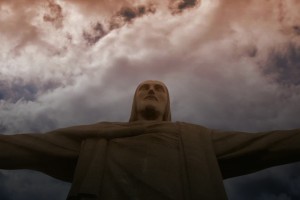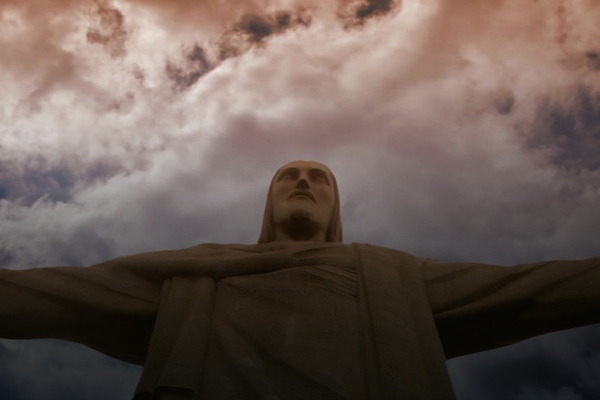
It really shouldn’t surprise us that there may be some broad similarities between Jesus and the “deities” imagined prior to His arrival. I think it is reasonable to envision something that later becomes a reality (even if only in part), and there are good examples from history to illustrate this. A man named Morgan Robertson, for example, once wrote about a British ocean liner that was approximately 800 feet long, weighed over 60,000 tons, and could carry about 3,000 passengers. The ship had a top cruising speed of 24 knots, three propellers, and about 20 lifeboats. This ocean liner hit an iceberg on its maiden voyage in the month of April, tearing an opening in the starboard side, forward portion of the ship, and sank along with about 2,000 passengers. Recognize the ship? Let me give you another clue: The ship’s name was spelled T-I-T-A-N… If I stopped right there, I bet you would recognize this ship as the Titanic, right? If so, you would be wrong. While the description is eerily similar to the Titanic, the ship Robertson described is the “Titan” and it is a fictional vessel from his book, The Wreck of the Titan (also called, Futility), published by Buccaneer Books (Cutchogue, New York) in 1898. This book was written fourteen years before the Titanic disaster took place, and several years before construction was even begun on the Titanic. Morgan wasn’t the only one who seemed to be able to envision the future; in the 1880’s, the well-known English journalist, W. T. Stead also wrote an account of a sinking ocean liner in the mid-Atlantic, and by 1882 had added the detail that an iceberg would be the cause of the disaster. Even these authors weren’t alone in their vision of the future. Many prospective passengers of the Titanic cancelled their tickets at the last minute, citing premonitions the ship would suffer a similar fate.
How were all these folks able to so accurately foresee the fate of the Titanic? How could Robertson describe the Titanic so accurately? Well, it is quite possible that these men and women had a prophetic gift of sorts (after all, even atheists will concede that some among us are at least more intuitive than others), but it is also reasonable that they simply observed the world around them, thought about the possibilities, examined the history of shipbuilding leading up to the era, and accurately imagined what the Titanic might someday become. Now, let’s fast-forward one thousand years and imagine we are examining the historic truth of the Titanic. If we discovered Robertson’s story of the Titan, do you think we would find ourselves saying, “Hey, that story about the Titanic is a lie, it was just a re-creation of a prior piece of fiction called the Titan!” I hope not. I hope, instead, that we would evaluate the evidence related to the existence of the Titanic, read the eyewitness accounts, study the impact the event had on history, and then make a decision about the event. I would hope that a prior piece of fiction would not stop our search for the truth. As it turns out, the similarities between the Titan and the Titanic are far greater than the similarities between any pre-Christian mythological god and the real Jesus Share on X
As it turns out, the similarities between the Titan and the Titanic are far greater than the similarities between any pre-Christian mythological god and the real Jesus described on the pages of the Bible. It doesn’t surprise me that the ancients would dream and yearn for a better understanding of the God of the universe. If God has placed his moral truth in our heart (Romans 2:14-15), and hinted at his existence with the wonder of the created world around us (Romans 1:18-19), it is reasonable men and women would think, imagine and dream about the nature of God (even before He was revealed in the Bible). I would expect these mythologies to bear a resemblance to the reality of God once He is revealed to us, just as the Titan resembled the Titanic.

J. Warner Wallace is a Dateline featured Cold-Case Detective, Senior Fellow at the Colson Center for Christian Worldview, Adj. Professor of Christian Apologetics at Talbot School of Theology, Biola University, author of Cold-Case Christianity, God’s Crime Scene, and Forensic Faith, and creator of the Case Makers Academy for kids.
Subscribe to J. Warner’s Daily Email
Save
J. Warner Wallace is a Dateline featured cold-case homicide detective, popular national speaker and best-selling author. He continues to consult on cold-case investigations while serving as a Senior Fellow at the Colson Center for Christian Worldview. He is also an Adj. Professor of Christian Apologetics at Talbot School of Theology, Biola University, and a faculty member at Summit Ministries. He holds a BA in Design (from CSULB), an MA in Architecture (from UCLA), and an MA in Theological Studies (from Gateway Seminary).

































Pingback: Those Pre-Christian Deities Aren’t Much Like Jesus After All | Christian Apologetics Alliance
Pingback: Those Pre-Christian Deities Aren’t Much Like Jesus After All | The Christian Apologetics Alliance
Pingback: The Reasonable Expectations That Cause Mythologies to Resemble Jesus | Cold Case Christianity
Pingback: Those Pre-Christian Deities Aren’t Much Like Jesus After All | Cold Case Christianity
Pingback: Why We Shouldn’t Be Surprised Some Pre-Christian Deities Are Similar to Jesus | TLG Christian News
Pingback: Link-O-Rama | Sagittarius Dolly
Pingback: Why We Shouldn’t Be Surprised Some Pre-Christian Deities Are Similar to Jesus | Cold Case Christianity – Reformed faith salsa style